
by Rudy Lucas
Do you remember the time you’d go shopping for something and it took you all day to purchase it because you’d store jump and compare prices? How about the time you needed a plumber and you opened up what seemed to be endless listings inside the Yellow Pages? It wasn’t that long ago, huh?
Here’s a fun fact for you: SEO, or optimization, has been around since the late 60s. The idea was to collect a large amount of data and then organize it by category or industry. This directory would contain commercial and non-commercial listings for consumers. However, the concept of “saving time,” customer experience and advertising, dates back to the earliest civilizations known to man. Businesses in the 70s would purposely call their business “A Plumber,” or “AA Plumbing,” or my favorite, “AAA Plumbing” because business owners realized that if they can be amongst the first listings in the directory (which at this time was in alphabetical order), they can capture more business. Customers cycling through the Yellow Pages for services that they need or think they need, is what we marketers call “intentional buyers.” They are ready to make a purchase now, and all that is left to do is decide who to buy from.
Fast forward to present day, the digital era. Buyers ready to buy now, will conduct organic searches to find specifically what it is they want to buy. Search Engine Optimization has evolved immensely since its birth 25 years ago. Google, Bing and other search engine platforms share one commonality, and that is that they are built for users, not for businesses. So, it begs the question, “Why is SEO important for MSPs?”
Here’s the obvious: SEO will improve your website’s overall searchability and visibility. Many brands and businesses, regardless of the industry, know (or maybe don’t know) that you need SEO for your digital properties. That’s it, the end — right? Unfortunately, I wish it was that easy to sell to an MSP on the importance of SEO for their business.
Fact: I know MSPs right now that are eager to grow and scale, but their SEO is blank; thus, resulting in being a ghost online. Title tags, meta descriptions, keyword phrases — all absent on the back end of their website! I’ll even be a little more aggressive here and make this statement, “If you don’t take SEO seriously, your MSP will drown in the abyss.” The consensus is that most MSPs, if not all MSPs, struggle with lead generation and sales. I wonder why that is? Allow me to admonish in kind — your marketing efforts suck! Now, this isn’t entirely your fault. I can’t hold it against those that are simply uninformed about SEO and how it works. So, to the population of MSPs that are just foreign to the importance of SEO, you’re forgiven. To those that do know, however, and flat out ignore it — you know who you are — I want to help you and all MSPs have a “renewal of the mind” about SEO. Outside of the obvious reasons as to why SEO is necessary for your MSP, here are a few more to bring it all home:
1. Organic Search Is the Primary Source of Website Traffic
With Google owning about 75% of the search market, it matters whether you’re fully optimized or not. Google now has over 200 ranking factors to determine whether you are found on an organic search or not. This includes: the speed of your website, whether or not you’re mobile friendly, accuracy of keywords to your web pages and images, and many more! Think of it like this: let’s say you’re on a sales call and your prospect is listening to your pitch. They say to themselves, “Wow, this is exactly what I need!” As you’re pitching away, your prospect attempts to find you online while actively listening to how you plan to resolve their issues. You can’t blame them for digging a little deeper about who you are, right? If we can be honest with ourselves, do you think they are going to buy services from a tech company that has little to no information online about themselves — no website or LinkedIn page? Can you imagine the gravitas associated with a prospect asking you how to find you online?! Being highly visible as a trusted resource by Google and other search engines is always going to work in your MSP’s favor. A high-quality website and quality SEO build trust and credibility.
2. Good SEO Means a Better User Experience
We all wish to be at the top of a Google search result for maximum visibility. In doing so, that also leads to a maximum user experience. Google has learned how to interpret a positive or negative user experience, and a positive user experience has become one of the 200+ ranking factors that is a pivotal element to a website’s success. Remember the term “intentional buyer?” Customers know what they want, and if they can’t find it, there’s a problem. Really pay attention to the next time you search for something using Google. Have you noticed that Google is more of an answer engine, offering specific data on the SERPs (Search Engine Results Pages) for users? This is designed to offer users the information they seek in fewer clicks, quickly and easily.
3. Local SEO Means More Engagement, Traffic and Conversions
In 2014, mobile search surpassed desktop search for the first time in history and it hasn’t looked back. Local search has become a fundamental part of small and medium-sized businesses. It aims to optimize your digital presence within a specific geographic location, so that people can find you quickly and get them closer to a sale. To promote this, you should optimize your brand’s Knowledge Graph panel, your Google My Business listing, and your social media profile. Another key component to the success of your local SEO is the importance of Google reviews and the like. Globalization matters! There’s an old Jewish proverb that says, “Do not boast about yourself. Instead, let others boast about you.” Good reviews for the services you provide helps you immensely on acquiring new business. It also holds you accountable for the services you are promising to deliver.
4. SEO Brings New Opportunities
A solid SEO will always discover and leverage new opportunities for your MSP to be discovered and shine. The better your brand is understood, the more opportunities will arise to help you thrive. Recently, I conducted an organic search for “MSP” in Google. Want to know what came up? First, Google thought I made a spelling error and suggested that I meant to search “maps.” After trying again, it thought I meant the airport code for Minneapolis-St. Paul. After a third try, it suggested I might want to play Movie Star Planet, a social game for kids. I also got the Michigan State Police. What does this all mean? It means that as a member of the MSP community, we are doing a poor job of communicating who we are, what we do and how we do it. If you don’t believe me, Google it! As a community, we can no longer ignore the importance of SEO for our industry. Collectively, we must do a better job of being ambassadors of managed services and really pump more content out there for the SMBs to know that we even exist. There are so many businesses that could really benefit from managed services and it is our fiduciary responsibility to be proactive with our SEO efforts to not only benefit from it financially, but also to educate the vast population that doesn’t even know our services exist. Take it from someone who didn’t know what “MSP” meant until joining The 20.

by Dan Astin
The statistics are daunting. A great percentage of SMBs and, in particular, MSPs and other tech services firms will never reach $5,000,000 in gross revenue. As such, growth through careful acquisition of other SMBs or their assets is a great way for MSPs to increase lead gen, sales and scale.
Here are 5 fundamentals — practical keys — to increasing the likelihood of success in pursuing acquisitions:
1) Assets v. Stock
Consider buying assets only. Acquiring assets without assuming liabilities may provide the greatest ROI at the most competitive price. Many times the seller just wants out, and the tribulations that led to the decision to sell are often better left behind.
2) Acquisition Entity
The decision whether to acquire through your existing entity or a NEWCO will depend on a variety of factors, including newly-enacted tax laws. Consult with your financial, legal and tax advisors to be sure you make the most beneficial decision.
3) Due Diligence
The “opportunity inspiration” of the deal often results in a rush to get the deal done. There is no substitute for caution through due diligence in an acquisition. First up, on every deal pursuit, there should be financial and other diligence depending on the nature of the deal. Consult your professionals to assist. Even basic diligence through review of financials and tax returns can help avoid wasted time and acquisition costs when the numbers don’t measure up.
4) Term Sheet
Assuming you get past the diligence stage, work with your professionals to draft a term sheet with the core deal components. Many times, once the parties have term sheet in front of them, one of the parties determines they are not on the same page after all and at the very least disconnects may be easier to work out. Going straight to an APA may be less cost-effective if the deal is not consummated. At the contract stage, parties often become intractable when their deal term expectations are not met.
5) Just Business
Remember that it’s a business deal. Becoming emotionally attached to the thrill of the “great” deal will color judgement and lead to disappointment if the deal does not close — or, worse yet, buyer’s remorse when unbridled enthusiasm wanes after closing and it becomes clear it wasn’t such a great deal.
Dan Astin is a business attorney and consultant with offices in Philadelphia, Wilmington and San Diego. He’s a Managing Partner of Ciardi Ciardi & Astin.
Tell us a little about your MSP…
Carefree Technology was started in California in 2001. In 2014 we moved to Utah to be closer to family, so we now have offices in California and Utah, and thanks to The 20, we have clients in Washington, Oregon, California, Utah and Colorado!
How long have you been a member of The 20?
We joined The 20 in November of 2018.
Why did your MSP originally look to partner with The 20?
We joined The 20 because it was time to grow our business. In 2001, when I quit the best job I ever had, it was so I could reclaim my time and be an active, present influence in raising our 4 kids. As our company grew, I noticed that the more employees we had, the less time I could spend with my family. Somewhere along the way, I made a conscious decision to have a “lifestyle business” so I could maintain my desired quality of life.
In a space of 4 months in 2018, 2 of our kids got married and another left for college. Now that our kids are leaving, it is time to change our focus from maintaining a lifestyle, to preparing for retirement by building a strong, profitable business and The 20 was perfectly positioned to provide the leverage we desired so we wouldn’t have to build and manage our own internal support desk.
Tell us about the biggest change in your business since joining The 20.
Our biggest change since joining The 20 is largely psychological and emotional. We no longer look at a large opportunity and think, “That’s too big for us.” Now we look at those larger environments with a hopeful expectation that we can provide what others cannot.
What do you like most about being a member of The 20?
It’s a toss-up between the Support Desk and the community. I love reviewing ticket notes and activities provided by the Support Desk that I didn’t have to be involved with. However, The 20’s partner community is really unique. I have developed many close relationships over the years with “friendly competitors,” but the level of camaraderie in The 20’s partner community is truly special.
What do you think is the most important quality necessary for success?
To be successful, you need to know what has lasting value and importance to you and your family and then work towards that goal every day. As long as you are working towards a meaningful end, you are successful regardless of how long it takes. The moment you identify what is important and move in that direction, you are a success.
What are your biggest business challenges?
With all the demands on our time, our largest challenge is always maintaining a consistent focus on sales and marketing activities.
What are your areas of focus for 2019?
Working with The 20 has opened the door to much larger clients. Our focus for 2019 is learning how to work with these larger, more complex environments so we can continue to add more of them.
What advice would you share with an MSP looking to scale their business?
Be honest about your shortcomings and find people or organizations who are strong where you need help. For us, that was joining The 20. It has been an absolute game-changer!
What book are you currently reading?
My ADD makes reading quite a challenge; too many shiny things around. However, I love audiobooks on 2x or even 3x speed. This month I have listened to the following titles: The Road Less Stupid: Advice from the Chairman of the Board by Keith J. Cunningham, The Speed of Trust by Stephen M. R. Covey and Anxious for Nothing: Finding Calm in a Chaotic World by Max Lucado.
Favorite blogs / podcasts
If I’m not listening to audiobooks, I enjoy listening to comedians like Jim Gaffigan or watching Good Mythical Morning with my daughter.
Interested in becoming a Partner? Click here for more information!

by Camden Rendon
Wondering if you should intern in college? Internships are fast-growing and more important than ever – for multiple reasons. Internships are proven to help students learn and prepare for the real world after college, because classrooms can only teach so much. Some schools and/or majors require internships in order to graduate, and some just encourage finding one (or two, or three) before graduation. Here at The 20, we completely support the learning process of students, and have opened up three summer internships this year to help in that process. It’s not to be taken lightly – we know that we are helping to shape the next generation of professionals. Here are five reasons that you should intern in college – bonus points if you want to work with us! ????
Network and Learn Under Professionals
Though there are many reasons you should intern in college, this one is reason enough to get an internship. I say this to every new grad I meet – you NEVER know who knows who and who you will meet. Connections go SO FAR in the workforce, to the point that some people hire solely off of referrals. Building connections and networking with people is a great way to learn about tons of opportunities in your field. In addition, learning under industry professionals can be great for your resume. If you get a good mentor to coach you through your internship and teach you as much as possible, you will come out of the internship with information that you can apply in your next (potentially full-time) role. As an intern, it’s your responsibility to be engaging, prepared, and to soak up as much as possible, as there will be so much to learn.
Figure Out What You Want in a Career… and What You Don’t Want
Sometimes we don’t know what we want to be when we grow up – and that’s okay! College makes you feel pressured to choose a major that will fit in with a career, but what happens if you don’t know what you want to do? The best way to test out different roles is through internships. You’ve got to start somewhere to gain experience, and companies are pretty supportive of that. According to NACE, 81% of graduates report that internships helped them to shift their career directions by changing either the focus of classes or their major. You may have your heart set on a particular profession, but after working it for a summer, may decide that it wasn’t for you – or that you like something better. Your college years are the years to explore, make mistakes, and learn from them.
Real World Application
Let’s be real – your college classes and professors can only teach you so much while you’re sitting at a desk. You’ve got the brain knowledge, but what about the real-world application? No number of tests, pop quizzes, or projects will prepare you for what is required in a professional position. You will get to apply your textbook knowledge to things that you will apply in your day to day role.
Full-Time Opportunities Post-Graduation
It’s no secret that interns are usually the first to be considered if a full-time role opens up. According to Forbes, paid internships turn into full time job offers 60% of the time. Interns spend their time getting to know the company, the employees, and the position itself – meaning it’s the easy option when it comes to a full-time role. Companies can cut down on their spending for sourcing, hiring, and training a new employee, since the intern already has that knowledge. It’s important to be prepared, timely, and always give 110% throughout your internship.
Make Your Resume Stand Out
So let’s say for one reason or another, your internship doesn’t turn full-time. That does NOT mean that you wasted your time! Not only are you leaving there with actual, tangible experience, but you should also have some solid recommendations under your belt! In a sea of entry-level graduates and applicants, how can you make yourself stand out? By relating your internship experience to the next position! You’ve already got a leg up on the competition if you join an entry-level role with experience.
Want to join our awesome team? The 20 is hiring interns! Check out our open positions here.
2019 MSP 501: Calling All MSPs!
Ever wondered how you rank against your peers? Well, now you have the perfect opportunity to find out as Channel Futures presents the annual MSP 501 ranking list.
The MSP 501 list recognizes Managed Service Providers (MSPs) from all around the globe among the world’s top 501 MSPs, so if you haven’t already entered, here’s what you need to know (and fast) while entries are still open:
More Than Just a Ranking…
For twelve consecutive years, Channel Futures has hosted the annual MSP 501 as a celebration of the world’s top MSPs. What first began as simple report derived from a selection of channel partners, has since evolved to demonstrate exactly how these MSPs earned their ranking.
Have You Applied Yet?
Just in case you haven’t, it’s not too late! While the process is far from quick and easy, you still have time to submit your online application here – entries close on Friday, 31 May at 11:59pm ET.
Channel Futures strive to make this process easier than before, so if you need help or have any questions regarding the Channel Futures 2019 MSP 501 List questionnaire – visit here for further information.
What’s in It for You?
Other than the glory, you’ll also receive a marketing package (to share with the world), an official award and special recognition at the annual gala awards (details below), VIP entry to the Channel Partners Evolution and of course, awesome media coverage across Channel Futures’ sites.
The Annual Gala Awards
Winners are to be announced at the MSP 501 Awards as part of the Channel Partners Evolution Conference, held at the Walter E. Washington Convention Center in Washington D.C. on Tuesday, 10 September 2019 from 5:30pm – 9:00pm. Join The 20 team there!
To find out more about the MSP 501 List, please visit here.
The second ChannelPro event of the year found itself in Chicago, IL on May 2, with the special pre-day event hosted by The 20, Cytracom, Compliancy Group, and Deep Instinct on May 1!
The event kicked off with a pre-day workshop on The Building Blocks of a Mature MSP.
The 20 hosted this alongside Cytracom, Compliancy Group, and Deep Instinct. The workshop covered the top challenges MSPs face, go-to-market strategy, adding monthly recurring revenue, developing stickier client relationships, and more!
The seminar also included two panel sessions, including one highlighting successful MSP owners: Rob Boles of BLOKWORX, James Velco of Tech Noir Solutions, Will Foret of Spot Migration and Paul Redding of Carlin Bradley. The vendor panel session featured Chuck Everett of Deep Instinct, Dave Goldie of Cytracom, Marc Haskelson of Compliancy Group and Tim Conkle of The 20.
It was a full house and so much fun.
The theme was Bigger. Better. Business. and the jam-packed event featured presentations from some of the brightest minds in the business who shared their insights on the hottest tech solutions in the SMB marketplace today. IT consultants, VARs, integrators, and managed service providers of all types networked with peers, and got detailed information on the latest technology trends and solutions.
The event concluded with attendees honoring vendor sponsors with the following awards:
Best in Show: Datto
Best Cloud Solution: Webroot
Best Hardware Solution: Epson and HP (tie)
Best New Solution: Domotz
Most Innovative Solution: TruGrid
Best Partner Community: Datto
Best Software Solution: NinjaRMM, RapidFire Tools (tie)
Best Revenue Booster: Datto
Best Add-On Product: SherWeb
Best On-Stage Presentation: The 20
Best Solution Presentation (Platinum or Gold sponsors): The 20
Best Solution Presentation (Silver sponsors): NinjaRMM
Best Distributor: SYNNEX
Best Silver Selfie: ConnectBooster, Domotz (tie)
Best IoT Solution: Domotz
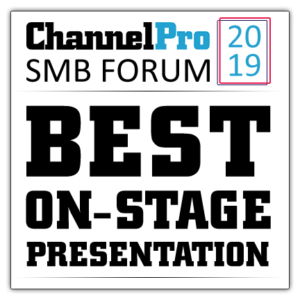
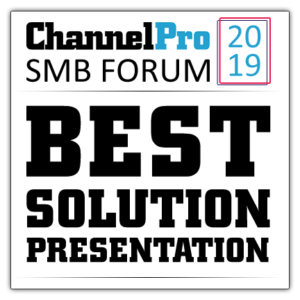
The next seminar will be held in San Jose September 4-5!
Spots are filling up fast, so interested attendees should register immediately here!
We hope to see you there!
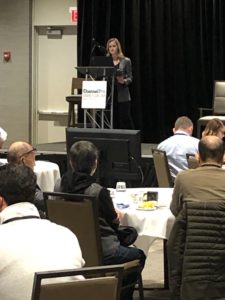
Crystal McFerran, SVP Sales and Marketing.
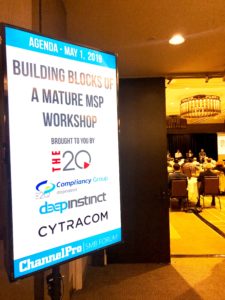
The 20-hosted workshop.
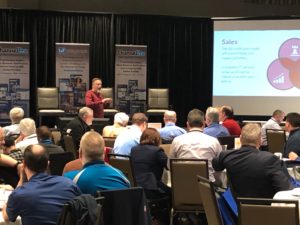
Tim Conkle, CEO.
It would certainly appear that an increasing number managed IT service providers are selecting a vertical specialization in an effort to become more profitable and scalable. And really, why wouldn’t you? That doesn’t sound like a bad gig!
The numbers demonstrate that when an MSP picks key vertical markets to infiltrate, they end up having enormous success. But why do so many companies elect not to do this, and become the experts in certain practices?
Why vertical specialization is important.
While at one time, simply offering a help desk, network admin, or backup was unique and innovative, this is just not the case today. Adding to this, the cost barrier to compete as an MSP has never been lower. And services such as service desk and NOC are easily outsourced. This influx of competitors and lower barrier to entry has certainly led to a bottleneck. A 2018 survey of the top 501 MSPs by Channel Futures reports that “only 22% of the companies that earned a spot on the MSP 501 this year offer no sort of vertical-market focus.”
It would appear that the best performing and higher growth MSPs have developed a vertical specialization.
Think about it… most business owners are seeking an IT provider they perceive understands their business the best. This is where vertical specialization will help to separate your MSP from the others.
Put yourself in the business owner’s position; all things considered equal from an IT support standpoint who would I trust my IT to more? Chances are the MSP that exhibits the most business knowledge and understanding about their workflow will win the business. Even better, this MSP will most likely be able to charge a premium for the same services.
We talked to some of our partners who specialize…
WCI Technology Solutions has historically focused on financial advisors as a primary niche. This particular niche also fits very well with one of WCI’s core focuses: “Protecting What You Value Most,” and The 20 has helped WCI confidently provide this to that niche. I believe WCI has been successful with financial advisors because we have always been very aware that we needed to keep our clients, and their information, safe… Combining The 20’s help desk, security tools (like Deep Instinct), mindset, and working with their strategic partners like The Compliancy Group, WCI is extending our focus to become known as “The Compliancy Experts.” This will enable us to successfully enter additional niches like medical and manufacturing.
–Bill Wright, Owner, WCI Technology Solutions
Stratocent Technologies has a strong partnership with professional services firms – tax and accounting, legal, engineering firms in particular. Each of these have deadlines, mission critical data, regulation, compliance concerns, and a business model that relies heavily on their computers and networks. Our focus on mission-critical environments and workflows has worked very well to prevent downtime, increase confidence and productivity for our clients, often saving them money or increasing profitability in the process.
–Jim Bachaud, CEO, Stratocent Technologies
In our 10th year, BLOKWORX went channel-only when the majority of our new business was peer team and other MSPs looking for assistance. We have a strong presence in financial and other compliance-based industries.
–Rob Boles, President, BLOKWORX
…[TechNoir Solutions provides] IT support to nationwide co-working spaces (commercial real estate). Not only do we get their network up and running, but we can deliver ongoing support to the small businesses that comprise those spaces… Our mission is to be the technology advocate for startups and rapidly growing businesses that are experiencing technology growing pains.
–TJ Mitchell, Director of Sales and Marketing, TechNoir Solutions
How does an MSP determine a vertical specialization?
Look across your client base and study each of your clients. See what you got. And know that verticals aren’t just about particular industries — it’s a melting pot of many factors. Here are items to review when selecting verticals:
- Industry verticals: What particular industries are technology-dependent or see technology as a strategic asset?
- Technology verticals: Do you have knowledge of a particular technology that is in demand? Do you specialize on a particular security offering? Maybe it is document management or some other technology that many MSPs seem to not bother with.
- Geography: Are there particular geographies that are more lucrative than others? Are their parts of your city or state that are not serviced well by all the other managed service companies?
What do you have to lose?
Looking to fast track the growth of your MSP? Click here to learn more about The 20.
Tell us a little about your MSP…
I started Tech Junkies in January of 2007 in Hays, KS (I’ll wait for you to Google Maps that). I was working full time for a local ISP and fixing computers on the side. I started making more money from my side gig than my full-time job, so I decided to venture out on my own. I used my older brother’s four wheeler as collateral, got a loan for $8,100, signed a lease on a retail space, quit my job, cashed out what little I had in my company retirement, then went home and told my wife what I had done (I strongly recommend you put that last item first)! She was a bit shocked, but supportive. We were doing retail computer repair initially, but quickly started to transition into managed services for local businesses. Seeing need in our area for both residential and business IT solutions, we continue to offer both, utilizing a MSP service model.
How long have you been a member of The 20?
I was in The 20 before it was really ‘The 20.’ I was on the first call with Tim that started to form the concept of The 20. Since that time, I have been all in with The 20 model. I have seen it grow from just a concept to what it has become today. I guess I’d be considered the OG of The 20.
Why did your MSP originally look to partner with The 20?
After hearing the concept, I was on board right away. My goal with Tech Junkies was to scale on a massive level. I saw partnering with Tim and The 20 as my best option to do so.
Tell us about the biggest change in your business since joining The 20.
Starting day 1 we could handle almost any client that walked in the door. Coming back from the first meeting in Dallas I closed my biggest deal up to that point. Before The 20 I would have been gun shy to take on such a large client. However, with The 20 on my side it was an easy process to onboard and support.
What do you like most about being a member of The 20?
The community. We have all become such a tight community between the partners, The 20 Leadership, and even The 20 staff. I have forged business relationships and friendships that will last a lifetime.
What do you think is the most important quality necessary for success?
The ability to execute. I think some people just lack the ability to execute on ideas. Talk it great but it’s the walk that will make you money.
What are your biggest business challenges?
Lead generation. I don’t think I’ll ever be happy with the leads we are getting, I’ll always want more.
What are your areas of focus for 2019?
We are focusing on adding a comprehensive Cybersecurity Solution for all of our current clients and prospects. We handle managed IT services one way… the right way. We now offer a layered approached to cybersecurity defense based on the relationships that we have built through The 20.
What advice would you share with an MSP looking to scale their business?
Join The 20! Don’t re-invent the wheel. Let The 20 bring their expertise to the table on the operations and service delivery. You as a business owner should be focusing on marketing and sales.
What book are you currently reading?
Scaling Up byVern Harnish (I’m always re-reading / listening to it).
Never Split the Difference by Chris Voss.
Favorite blogs / podcasts
GaryVee – I usually have GaryVee or some other audio playing in the background all day.
Earlier this month, we saw the first of four ChannelPro SMB Forum events this year that featured presentations from industry experts and some of the top managed service providers in the country!
The event kicked off with a pre-day workshop on The Building Blocks of a Mature MSP.
The 20 hosted this alongside Cytracom, Compliancy Group, and Deep Instinct. The workshop covered the top challenges MSPs face, go-to-market strategy, adding monthly recurring revenue, developing stickier client relationships, and more!
The seminar also included two panel sessions, including one highlighting successful MSP owners: Rob Boles of BLOKWORX, Scott Meeler of Managed IT Systems, Terry Barden of Forward Systems and Paul Redding of Carlin Bradley. The vendor panel session featured Vance Carlaw of Deep Instinct, Dave Goldie of Cytracom, Marc Haskelson of Compliancy Group and Crystal McFerran of The 20.
It was a full house and so much fun.
The theme was Bigger. Better. Business. and the jam-packed event featured presentations from some of the brightest minds in the business who shared their insights on the hottest tech solutions in the SMB marketplace today. IT consultants, VARs, integrators, and managed service providers of all types networked with peers, and got detailed information on the latest technology trends and solutions.
The event concluded with attendees honoring vendor sponsors with the following awards:
Best in Show: Datto
Best Cloud Solution: Datto and SherWeb
Best Hardware Solution: Epson
Best New Solution: Domotz
Most Innovative Solution: Compliancy Group
Best Partner Community: Datto
Best Software Solution: Webroot
Best Revenue Booster: Cytracom
Best IoT Solution: Domotz and SYNNEX
Best Add-On: RapidFire Tools
Best On-Stage Presentation: The 20
Best Solution Presentation (Sapphire, Platinum, Diamond, Gold sponsors): Datto
Best Solution Presentation (Silver sponsors): bvoip
Best Distributor: SYNNEX
Best Silver Selfie: Domotz
The next seminar will be held in Chicago May 1-2!
Spots are filling up fast, so interested attendees should register immediately here!
We hope to see you there!
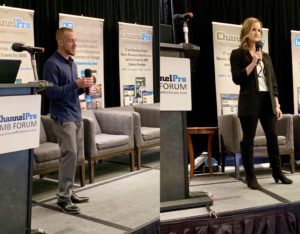
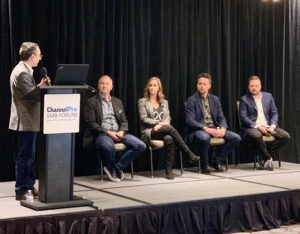
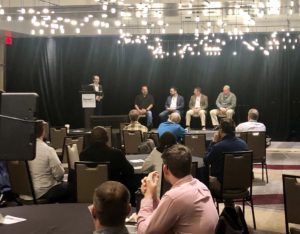
by Patrick Sullivan, Contributor
By understanding what Workspace as a Service (WaaS) has to offer your End Customer, you can ensure that you’re reaching the customers who will benefit the most from the cloud. WaaS has so much to offer to so many. But, who is the ideal prospect?
So often we are asked, “What’s the best vertical for your solutions?” and, “What industries do you typically target?” or, “What type of companies can WaaS help?”
WaaS has practical applications across every vertical and just about every size business. This widespread versatility gives our partners the flexibility to develop their solution and messaging for the verticals they are already targeting, or to focus their marketing and sales as broadly as they want.
Using the Core-4 to Find the Ideal WaaS Customer.
When evaluating a prospective WaaS customer, look for the Core-4, which will help you zero in on the ideal cloud workspace customer. If the prospect answers “yes” to any of these four questions, then you have a winner:
1. Will you require a server refresh or other large IT project within the next 12 months?
Especially this year as Microsoft will sunset Windows 7 and Windows Server 2001/2008 R2 next January, so many companies are going to have to decide: expensive fork-lift upgrade, or easy and inexpensive transition into the cloud. End Customers hate IT projects, and with the cloud, you can eliminate the majority of them, saving them money and resources, and building your cloud business in the process.
2. Do you have employees who work remotely? Or does your business have multiple locations?
In today’s global business environment, companies are turning more and more to hiring remote staff, often outside their geographic footprint. Consider a company who hires Susan whose sole responsibility is to meet with customers; any time she spends in the office is just wasted time. Or, what about a business who needs Grant’s specific expertise, but he lives in Seattle, hundreds of miles away. In both cases, the staffers need the same accessibility as anyone working from the office. In both cases, the company’s IT needs to have control over their technology. Cloud Workspace simplifies both of these, making them an easy reality.
3. Do you have extensive security needs?
Think about a small bank, finance company or insurance agent. These are small companies, but they store and share sensitive client information. Security is paramount for them. At CloudJumper, we work incredibly hard to ensure our solutions are inherently secure. Additionally, we have a number of optional security add-ons that help your End Customers who need even more.
4. Is your company’s IT function larger than your IT team can support?
This can come out in a number of ways. Of course, if they have big security needs, but maybe, they also have numerous software apps to manage and maintain. They might have tight IT requirements for maintaining certifications or franchise agreements. Maybe they have a mix of OS and devices that all need to connect. The list here is endless, and no doubt your prospects will share items they simply would love to off-load to the cloud.
Always Has Been, and Still It Remains, it’s the Core-4
These are the four prospect characteristics that so easily translate into a sale, and they always have in the 20 years we have been providing a WaaS solution. You will find them in businesses across every industry, every vertical, every part of the world. Understand them, recognize them, and the sale is yours! It’s just a natural fit.
By understanding the ideal WaaS customer, you will more easily grow your business in the cloud, and boost your sales, profits and the stickiness of your customer base. Especially as you are just starting to build your cloud business, start with the Core-4. Soon, you’ll find yourself supporting your customers in ways no on-prem server farm can handle.
Patrick Sullivan is the Channel Sales Manager for CloudJumper who uses his cloud expertise and business acumen to guide MSPs as they create and grow their companies in the cloud. His support helps them build an IT cloud solution that saves their end customers money, time and hassle. Patrick has been with CloudJumper since June 2015 and has been very successful working helping his partners build their businesses in the cloud. Prior to joining CloudJumper, he honed his business development skills working in the equipment finance industry for more than 8 years. In 2005, Patrick graduated from New Hampshire University with Bachelor of Science in Business Administration.











